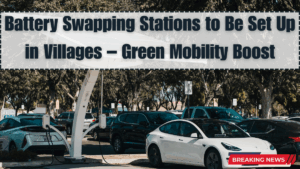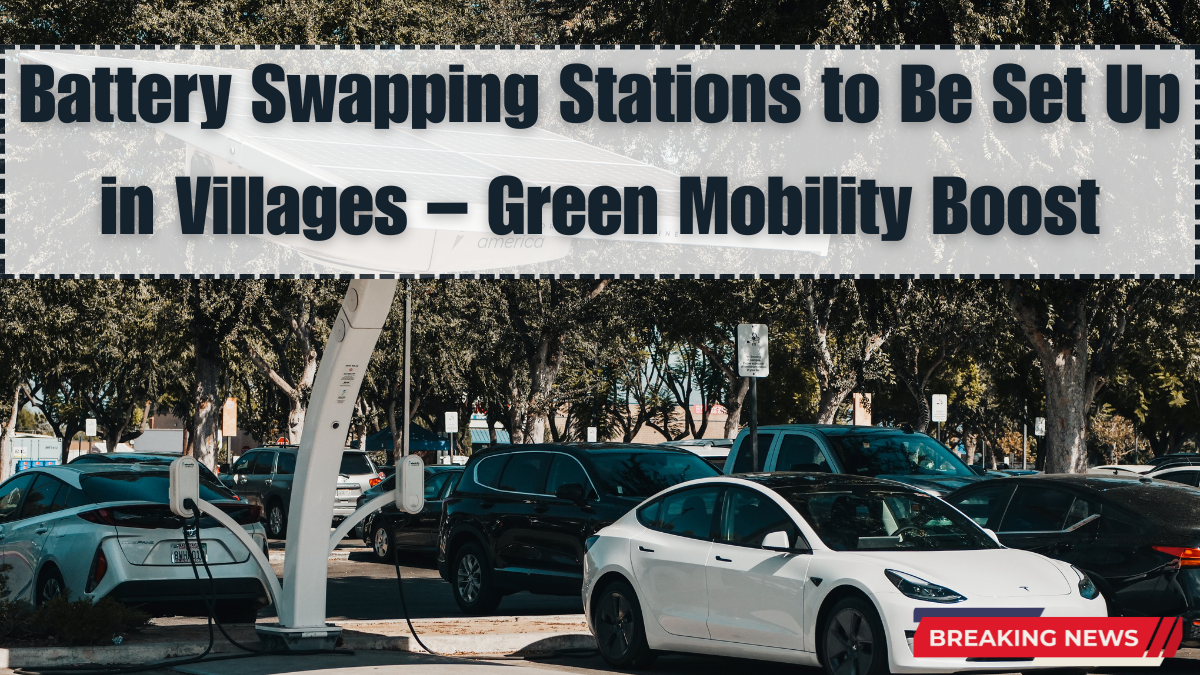In a move that’s revolutionizing green mobility in India’s villages, the government of Maharashtra has officially begun setting up Battery Swapping Stations in rural areas. These stations are being installed at gram panchayat-level locations, ensuring accessible and efficient battery replacement for electric two-wheelers and three-wheelers. This real-time rollout is giving a new face to last-mile transport and rural electrification efforts.
The goal of this project is simple—enable electric vehicles to thrive even in areas where traditional charging infrastructure may not be viable. By using Battery Swap technology, the state is making electric transport a daily reality for rural citizens.

How Battery Swapping Works and Why It’s Ideal for Villages
Unlike conventional charging systems, a Battery Swapping Station allows users to exchange a drained battery for a fully charged one in just a few minutes. This saves time, eliminates range anxiety, and reduces waiting periods—making it especially beneficial for remote regions with irregular power supply.
Benefits of Battery Swap for rural areas:
-
Quick 2-minute battery exchange
-
No need for home charging setup
-
Reduced EV downtime for drivers
-
Lower initial EV cost without fixed batteries
-
Round-the-clock availability in village hubs
With these advantages, Panchayat Infra is being upgraded to support future-ready transport systems.
Locations and Infrastructure in Place
The pilot rollout is already underway, with Battery Swapping Stations being installed at panchayat offices, bus depots, cooperative societies, and village haats. These locations are chosen based on daily footfall, connectivity, and local EV demand.
| District | Panchayats Covered | No. of Swapping Points | EV Type Served |
|---|---|---|---|
| Jalgaon | 20+ | 50+ | Two & three-wheelers |
| Beed | 15+ | 40+ | E-rickshaws, scooters |
| Solapur | 18+ | 45+ | Rural delivery EVs |
| Nanded | 12+ | 30+ | Passenger e-autos |
Each Battery Swapping Station is equipped with solar backup, cloud-based monitoring, and easy access systems for vehicle owners.
Boosting Gram Panchayat Infra for Green Mobility
The success of this initiative is largely due to strong involvement from local self-governments. Gram sabhas and Panchayat Infra teams are supporting the infrastructure upgrade by providing land, manpower, and awareness-building platforms.
Highlights of the Gram panchayat infra development:
-
Use of village common land for setting up battery kiosks
-
Local job creation for maintenance and supervision roles
-
Awareness sessions on EV benefits and battery use
-
Integration with state-level mobility apps for locating nearby stations
This model ensures long-term sustainability while empowering communities to take charge of their clean energy future.
Battery Swapping: A Scalable Solution for Rural EV Growth
With rising adoption of electric scooters and rickshaws in villages, the Battery Swapping Station model is fast becoming the backbone of rural EV infrastructure. It eliminates the need for costly grid extensions or personal charging units, making EV ownership more accessible.
Why this approach is working in rural India:
-
Ideal for low-income EV users without access to home charging
-
Minimal land and power requirements
-
High-frequency battery use = strong business model
-
Encourages shift from fuel-based to electric two-wheelers
This bold step is laying the groundwork for long-term Battery Swap systems that can be replicated nationwide.
FAQs
What is a Battery Swapping Station?
A Battery Swapping Station allows EV users to replace discharged batteries with fully charged ones, rather than waiting to recharge.
Where are these stations being installed?
They are being set up across Maharashtra’s rural areas, particularly within Gram panchayat infra like offices, haats, and bus stops.
Who can use these Battery Swap services?
Any electric two-wheeler or three-wheeler owner in the village can use these services—ideal for e-rickshaw drivers and delivery agents.
Why is this important for rural mobility?
It supports Battery Swap accessibility in regions where charging points are unavailable, making electric mobility more practical for rural transport needs.
Are these stations already operational?
Yes, several Battery Swapping Stations are already running in districts like Jalgaon, Beed, Solapur, and Nanded, and more are being added every month.
Click here to know more.
